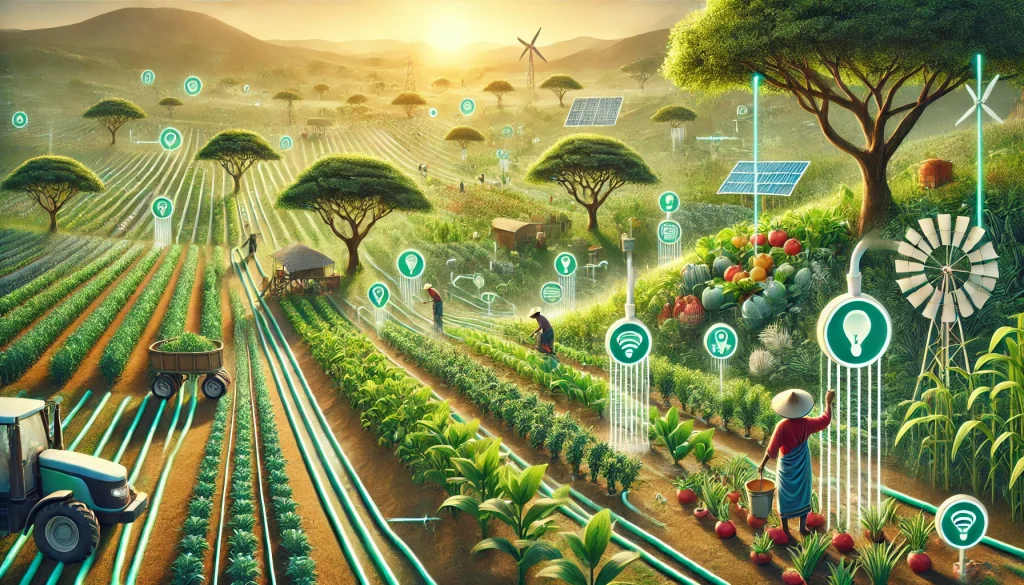Sustainable Agriculture Investment in Africa is experiencing significant growth, capturing the attention of global investors. This trend fosters economic development while promoting environmental sustainability and supporting local communities. As the continent faces numerous challenges, the move towards sustainable farming solutions opens diverse opportunities for innovation and growth. This article explores the current landscape of sustainable agriculture in Africa and the prospects it offers for investors and stakeholders.
The significance of sustainable agriculture investment cannot be overstated. It represents a crucial step in addressing food security, combating climate change, and enhancing economic stability. Investors are increasingly attracted to the region due to its untapped potential and the rising demand for sustainable practices. From innovative agricultural technologies to eco-friendly methods, Africa is paving the way for a greener future.
The current landscape of sustainable agriculture in Africa

Africa’s agricultural sector is undergoing a transformative phase, with sustainability at its core. The continent’s rich natural resources and biodiversity present unique advantages for developing innovative farming techniques. However, African agriculture is also profoundly impacted by climate change, which accentuates the urgency for sustainable practices. The transition towards environmentally friendly farming is not just a necessity but an opportunity to ensure food security and economic resilience.
Various initiatives, both governmental and international, have been established to promote sustainable agriculture in Africa. These programs aim to support farmers in adopting sustainable practices, ensuring the efficient use of resources, and enhancing agricultural productivity. These efforts are complemented by substantial financial and technological support, demonstrating a strong commitment to sustainability.
Governments across the continent are implementing policies that favor sustainable practices. These include subsidies for eco-friendly inputs and incentives for organic production. International organizations also play a pivotal role by providing assistance and facilitating knowledge transfer. Together, these efforts significantly contribute to the growth and viability of sustainable agriculture across the region.
Innovations driving sustainable agriculture
Technological advancements are at the heart of sustainable agriculture investment in Africa. Precision agriculture, which uses technology to monitor and manage field variability, enhances productivity while minimizing waste. Tools like remote sensing, GPS mapping, and data analytics enable farmers to optimize resources efficiently.
There is also a shift toward cultivating resilient crops and adopting organic farming methods, reducing reliance on chemical inputs while preserving soil health. Innovations like agroforestry and soil conservation further promote environmental sustainability and productivity.
Market trends and green finance
The growth of green finance plays a critical role in fostering sustainable agriculture investment in Africa. Carbon markets and green credits offer new revenue streams for eco-friendly agricultural practices. By participating in carbon trading, farmers can gain financial rewards for reducing emissions and implementing sustainable methods.
Green finance initiatives, supported by private investors and development banks, provide the necessary financial backing for adopting innovative technologies. Additionally, the expanding market for certified sustainable produce creates lucrative opportunities for African farmers, ensuring long-term economic benefits.
Opportunities for investors
Sustainable agriculture investment in Africa offers a myriad of promising opportunities for investors. The production, processing, and distribution sectors are ripe for development and expansion. As technology plays a pivotal role in modernizing these industries, investing in agricultural technology (AgTech) startups is becoming increasingly attractive.
Governments and financial institutions are offering various incentives for investors willing to support sustainable agriculture initiatives. These include tax benefits, grants, and access to affordable financing. Such incentives lower investment barriers and enhance the potential for high returns. Consequently, Africa is positioned as a favorable destination for forward-thinking investors seeking impactful ventures.
Numerous startups are emerging in the sustainable agriculture space, leveraging technology to improve efficiency and sustainability in farming. These innovative companies are attracting investor interest due to their potential for scalability and impact. Investing in such ventures not only promises financial returns but also contributes to sustainable development and poverty alleviation across Africa.
Strategic considerations and challenges
While opportunities abound, challenges such as limited infrastructure and climate risks remain. Establishing strong local partnerships is essential to navigate logistical difficulties and market dynamics effectively. Adaptive strategies and risk management can further mitigate potential threats. Collaboration with local communities is crucial, as understanding regional dynamics enhances project sustainability and mutual benefits. Strong relationships with stakeholders provide invaluable insights and improve project outcomes.
Future outlook and impact
Looking ahead, sustainable agriculture investment in Africa holds immense potential for transforming the agricultural landscape. By fostering innovation and eco-friendly practices, these investments can significantly contribute to food security and economic growth while minimizing environmental impact.
In conclusion, sustainable agriculture investment offers a pathway to a more resilient and prosperous continent. By supporting eco-friendly practices and innovative solutions, investors can drive positive change while achieving financial success. We invite interested stakeholders to explore the available opportunities and contribute to shaping a sustainable future for Africa.



